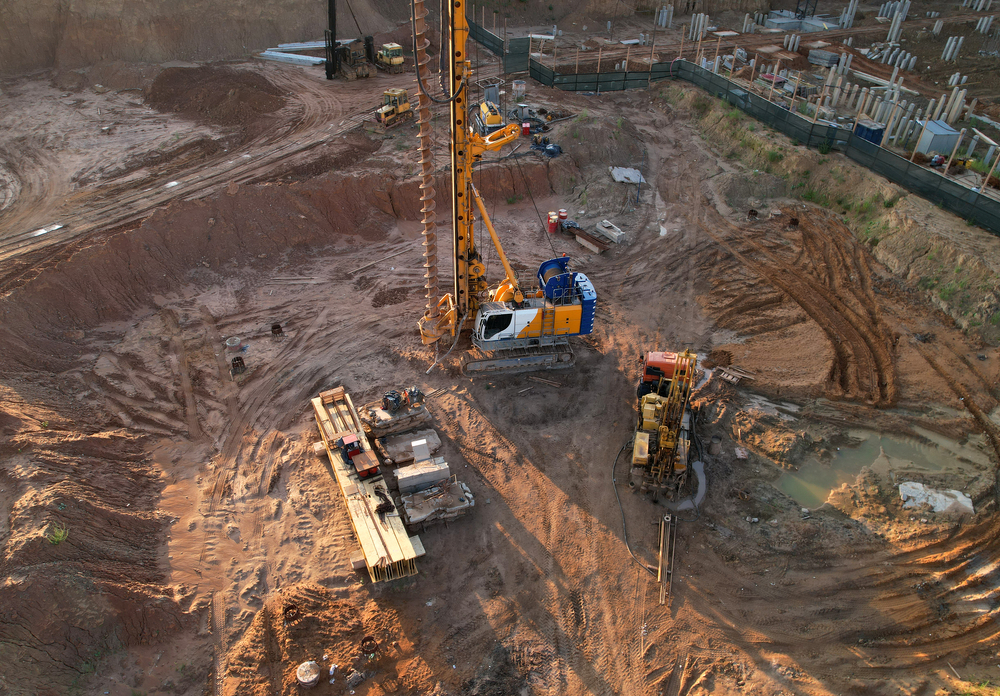Geotheta for Beginners
Table of Contents10 Easy Facts About Geotheta ExplainedThe Facts About Geotheta RevealedThe smart Trick of Geotheta That Nobody is DiscussingAll About GeothetaSome Ideas on Geotheta You Need To Know

They carry out site examinations, collect examples, do research laboratory tests, and assess data to evaluate the suitability of the ground for building tasks - Consulting Engineers. Based on their findings, geotechnical designers give referrals for foundation layout, incline security, maintaining structures, and reduction of geotechnical dangers. They team up with other professionals, such as designers, structural engineers, and building teams, to guarantee that geotechnical considerations are incorporated into the total task style and execution
By analyzing the habits and homes of soil and rock, they can identify possible geotechnical risks such as landslides, dirt settlement, or incline instability. Their know-how assists protect against failures or accidents that can threaten lives and property. Right here are some thorough duties and duties of a geotechnical engineer: Site Examination: Geotechnical engineers conduct site investigations to collect information on subsurface problems.
They translate the information to understand the homes and habits of the soil and rock, including their stamina, permeability, compaction qualities, and groundwater problems. Geotechnical Analysis and Design: Geotechnical engineers assess the information gathered during website examinations to analyze the security and suitability of the site for construction tasks. They do geotechnical computations and modeling to assess variables such as birthing capacity, settlement, slope stability, lateral earth pressures, and groundwater flow.
Geotheta Fundamentals Explained
Structure Layout: Geotechnical designers play a vital duty in creating foundations that can securely support the desired structure. They assess the dirt conditions and load demands to determine the proper foundation type, such as shallow structures (e.g., grounds), deep structures (e.g (https://sketchfab.com/geotheta)., heaps), or specialized strategies like dirt enhancement. They think about elements such as settlement limits, bearing capacity, and soil-structure interaction to establish optimum foundation styles
They evaluate building and construction plans, display site tasks, and carry out area evaluations to confirm that the design suggestions are adhered to. If unexpected geotechnical problems arise, they evaluate the circumstance and offer suggestions for removal or modifications to the design. Threat Assessment and Reduction: Geotechnical designers evaluate geotechnical risks and dangers connected with the job website, such as landslides, liquefaction, or soil disintegration.

Collaboration and Communication: Geotechnical designers work carefully with various other specialists associated with a task, such as architects, structural designers, and building and construction teams. Effective interaction and cooperation are crucial to integrate geotechnical factors to consider right into the overall task style and building process. Geotechnical engineers supply technical knowledge, answer queries, and make sure that geotechnical needs are satisfied.
The 3-Minute Rule for Geotheta
Below are some kinds of geotechnical designers: Structure Designer: Foundation engineers specialize in designing and assessing foundations for frameworks. They assess the soil conditions, tons requirements, and website characteristics to determine one of the most ideal foundation kind and style, such as shallow foundations, deep foundations, or specialized techniques like heap structures.
They review the variables influencing slope security, such as dirt buildings, groundwater conditions, and slope geometry, and establish techniques to stop incline failings and minimize risks. Quake Designer: Earthquake engineers focus on examining and making structures to endure seismic pressures. They assess the seismic danger of a site, evaluate dirt liquefaction capacity, and develop seismic design standards to make sure the safety and security and durability of frameworks throughout earthquakes.
They execute area testing, accumulate samples, and analyze the collected information to characterize the soil homes, geologic formations, and groundwater problems at a site. Geotechnical Instrumentation Engineer: Geotechnical instrumentation engineers focus on monitoring and measuring the behavior of soil, rock, and frameworks. They mount and keep instrumentation systems that monitor aspects such as dirt settlement, groundwater levels, slope movements, and structural variations to evaluate efficiency and give early warnings of potential concerns.
The 20-Second Trick For Geotheta
They perform examinations such as triaxial examinations, loan consolidation examinations, straight shear examinations, and leaks in the structure examinations to collect information for geotechnical analysis and layout. Geosynthetics Engineer: Geosynthetics designers focus on the design and application of geosynthetic materials, such as geotextiles, geogrids, and geomembranes. They make use of these products to enhance dirt security, strengthen inclines, provide water drainage options, and control erosion.
They often tend to be investigative individuals, which suggests they're intellectual, reflective, and inquisitive. They are interested, methodical, logical, analytical, and rational. Some of them are additionally social, suggesting they're kind, generous, cooperative, patient, caring, practical, empathetic, sensible, and pleasant - Consulting Engineers.
In the office setting, geotechnical engineers use specialized software application tools to carry out estimations, develop layouts, and examine data. They prepare records, testimonial project specifications, connect with customers and staff member, and coordinate job activities. The workplace setup offers a conducive environment for research, analysis, and collaboration with various other experts associated with the task.
The Facts About Geotheta Revealed
They frequently check out job sites to carry out website investigations, analyze geotechnical problems, and gather data for analysis. These gos to involve taking a trip to different places, in some cases in remote or challenging surfaces. Geotechnical designers may perform soil tasting, conduct tests, and display building and construction tasks to guarantee that the geotechnical facets of the task are being applied correctly.
Geotechnical designers additionally operate in specialized geotechnical research laboratories. In these centers, they carry out experiments, do tests on dirt and rock examples, and evaluate the engineering homes of the products. Geotechnical research laboratory designers function extensively in these atmospheres, dealing with screening equipment, operating tools, and taping data. They team up Geo Tech Engineering with various other laboratory team to make certain precise and reliable screening results.